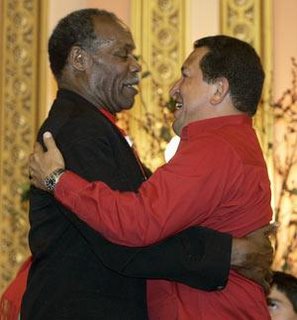Tere's
cross-blog post over at White Dade yesterday touched on a very interesting and sometimes controversial topic: what and who is considered white?
Racial and ethnic identification can be a muddy and touchy subject, and it is no different here in the United States, and in particular Miami. Here in Miami, anyone who is not either Hispanic or Black and was born in the United States is considered an "Anglo", regardless of whether that person is of English, German, Italian, Russian or Greek ancestry. The term Anglo has been misinterpreted and misused to include what are essentially "non-ethnic" Americans (read: families who have been here several generations and exhibit little if any trace of their ethnic background). This may not be a perfectly correct description, but it captures the basic essence of it.
Another term widely used these days to describe this group of people, even by Anglos themselves, is "Gringo". Don't even get me started on how much I hate that term. It is, at its core, an
offensive term used to deride those of English or English-speaking (i.e. "white") backgrounds. I remember as a kid, the only time that term was used was as an insult towards "anglos". Cubans rarely, if ever, used that term, instead opting for the more acceptable and correct "
americano". Mexicans were the only ones that I recall ever using this term, and always disparagingly. Today everyone uses it, even Cubans. I've been even called a gringo myself, even by fellow Cubans, due to the fact that my physical appearance doesn't fit neatly into the Cuban/Pan-Hispanic stereotype. In other words, I look "white". More on this later.
What is white, and who can be considered white? The old term to describe the white race is
Caucasian, but it has fallen out of favor due to the wide differences in physical appearances and traits which fall under it. Not many people realize that under the original definition, Middle-Eastern Arabs are as Caucasian as Scandinavians. This of course throws people for a loop because the typical Arab doesn't look anything like the typical Scandinavian. Therefore, Caucasian is now used to mean someone with a fair complexion, and Middle Easterners are who knows what (except white, of course).
Some of you may be wondering, what's the big deal with all this? Who cares what you're labeled or called?
I agree, it's no big deal. But I think it's an interesting subject strictly from a technical standpoint, although I will also say that the way that we view and (mis)interpret races and ethnicities shapes the way we see and treat people. That's why I think this is an important topic to address.
Here in the United States, in an attempt to bean-count all the different ethnic groups, the term "Hispanic" began to be used as a racial descriptor. Of course, Hispanic is most definitely not a race, instead an ethnic group used to lump together people of Spanish (from Spain) background or ancestry, whether through blood or language. Hispanics can be of several races, and often of mixed race. Also, Hispanics can and are frequently white. This throws a lot of people for a loop.
As a kid attending Miami public schools, I recall having to choose between White and Hispanic when filling in the race bubble on the standardized tests we would have to take every year. The same thing still happens when registering to vote. I was always tempted to fill in both, even though that wasn't allowed. Eventually I would fill in Hispanic as to acknowledge and distinguish my ethnic background. Still, I should never have had to make that choice. I, like many other Hispanics, am also white. We're a little better these days in making that distinction, but not by much.
As White Dade points out in the comment to Tere's post, white is more often used as a cultural determinant rather than a racial one. In other words, the original and correct meaning of the term has been replaced by one that describes people of a similar cultural background. Therefore, Hispanics, no matter how white they look, aren't white (the picture in Tere's post drives this point home).
Some of you may still be shaking your heads wondering: what's the big deal here Robert?
The big deal lies not in what color we are, because we have no choice in the matter. We are all human beings and we should all be treated as such. Again, the importance of it lies in how these descriptors shape our views and perception of others. Too often, White or Anglo is implied to mean American, while those who are Hispanic, Black, etc are something else.
Yes, we often foster this misperception when we label ourselves as Cuban-American, African-American, etc., but as the comment thread at
yesterday's Transit Miami post indicated, these descriptions are used more as an enhancement of American, not as a replacement or even as a modifier. We're also forced to use these terms to a large extent due to the fact that many of us (Cuban-Americans) don't fit into the stereotypical definition of an "American", which again can be used in a negative way when it falls in the hands of the wrong people.
Before I wrap up this long-winded thesis up, I want to make clear that I am not pointing the finger at any one group of people here. Misperceptions of race and ethnicities transcend cultural and racial groups. How many Cuban-Americans out there have heard a parent or grandparent refer to Anglos as
americanos and American-born blacks as, well, blacks? One of the episodes of Que Pasa, USA deals with this issue, where the American-born C-A calls his black Cuban friend "Cuban" and his other American black friend "black", even though they are both racially black.
In closing, it doesn't matter what we are, and it may not even matter what we call ourselves. I believe, however, that we must be as accurate as possible when describing other people, because it allows for greater understanding, and eventually acceptance, of different backgrounds and cultures.
![[freedomtowernight_edited.jpg]](https://blogger.googleusercontent.com/img/b/R29vZ2xl/AVvXsEi-x7_mwi5EYyZJxpzNqsvkYATDseYTHIovP09YKrIctspB17DY_5s2AeackCCaZqX14NV-rcs5S81-anUoEkQcrbMqc9hATVpw0uU3hH1tyIbe0iq0Jfe5iTwGlJaoODZXAOt_Kg/s1600/freedomtowernight_edited.jpg)






![[yanomasnew.jpg]](https://blogger.googleusercontent.com/img/b/R29vZ2xl/AVvXsEjEh5xBwYB4BI84Cgkb-4HF_fhmRhKvr_04RHSZ1kySa9-x2qIDzPwZxsOPW8kY2PNWrqOcHIflfvAuq2h5T6bxOkEsPRPtC0eJX4vZAmquZw4-5-lxj2ijw7ygo-8WhjEPdEA2Hw/s1600/yanomasnew.jpg)


